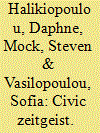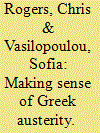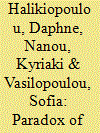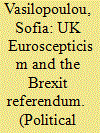|
|
|
Sort Order |
|
|
|
Items / Page
|
|
|
|
|
|
|
| Srl | Item |
| 1 |
ID:
120360


|
|
|
|
|
| Publication |
2013.
|
| Summary/Abstract |
This article examines the relationship between nationalism and liberal values and, more specifically, the redefinition of boundaries between national communities and others in the rhetoric of radical right parties in Europe. The aim is to examine the tension between radical right party discourse and the increasing need to shape this discourse in liberal terms. We argue that the radical right parties that successfully operate within the democratic system tend to be those best able to tailor their discourse to the liberal and civic characteristics of national identity so as to present themselves and their ideologies as the true authentic defenders of the nation's unique reputation for democracy, diversity and tolerance. Comparing the success of a number of European radical right parties ranging from the most electorally successful Swiss People's Party, the Dutch Pim Fortuyn List and Party for Freedom to the more mixed French Front National, British National Party and National Democratic Party of Germany we show that the parties that effectively deploy the symbolic resources of national identity through a predominantly voluntaristic prism tend to be the ones that fare better within their respective political systems. In doing so, we challenge the conventional view in the study of nationalism that expects civic values to shield countries from radicalism and extremism.
|
|
|
|
|
|
|
|
|
|
|
|
|
|
|
|
| 2 |
ID:
103383


|
|
|
|
|
| Publication |
2011.
|
| Summary/Abstract |
This article argues that radical right parties can be seen as displaying three patterns of opposition towards European integration: rejecting, conditional and compromising. These three patterns are identified through the careful examination of party attitudes on four different aspects related to European integration and the EU. These include the idea of a common identity of European peoples, the principle of cooperation at a European multilateral level, the EU policy practice and the desire to build a future European polity. In light of this conceptualization of radical right opposition to European integration, the article conducts a qualitative analysis of party literature of 12 radical right parties from 10 European countries during the latter part of the 2000s.
|
|
|
|
|
|
|
|
|
|
|
|
|
|
|
|
| 3 |
ID:
141658


|
|
|
|
|
| Summary/Abstract |
Greece’s economic instability has become the Western world’s longest-running monetary crisis. Will Germany allow the EU to keep propping up Greece’s unstable financial system? Will the country leave the eurozone? Will such a departure, if it occurs, unravel the idea of “Europe”? All valid questions. But behind them stands another equally profound social and political crisis that has made Greece the weak man of Europe.
|
|
|
|
|
|
|
|
|
|
|
|
|
|
|
|
| 4 |
ID:
118233


|
|
|
|
|
| Publication |
2012.
|
| Summary/Abstract |
The process of approving a Greek drawing on funds provided by the international community is now familiar. There is concern about the prospect of securing an agreement between the International Monetary Fund (IMF), the European Union (EU), the European Central Bank (ECB), and Greece, which satisfies all parties. This paper suggests that all parties to the agreement have interests in an orderly resolution of the Greek crisis that keeps Greece in the Eurozone. Furthermore, it argues that disagreements and delay before eleventh-hour agreements can best be explained politically. The paper first demonstrates how Greece, the IMF, and the EU each have a clear interest in finding an orderly solution to the Greek crisis that allows it to remain in the Eurozone. It then outlines the incremental nature of the package and its strategic benefit both for the European banking sector, and governments in Greece and the Eurozone more broadly.
|
|
|
|
|
|
|
|
|
|
|
|
|
|
|
|
| 5 |
ID:
113139


|
|
|
|
|
| Publication |
2012.
|
| Summary/Abstract |
What can explain the strong euroscepticism of radical parties of both the right and the left? This article argues that the answer lies in the paradoxical role of nationalism as a central element in both party families, motivating opposition towards European integration. Conventionally, the link between nationalism and euroscepticism is understood solely as a prerogative of radical right-wing parties, whereas radical left-wing euroscepticism is associated with opposition to the neoliberal character of the European Union. This article contests this view. It argues that nationalism cuts across party lines and constitutes the common denominator of both radical right-wing and radical left-wing euroscepticism. It adopts a mixed-methods approach, combining intensive case study analysis with quantitative analysis of party manifestos. First, it traces the link between nationalism and euroscepticism in Greece and France in order to demonstrate the internal validity of the argument. It then undertakes a cross-country statistical estimation to assess the external validity of the argument and its generalisability across Europe.
|
|
|
|
|
|
|
|
|
|
|
|
|
|
|
|
| 6 |
ID:
135879


|
|
|
|
|
| Summary/Abstract |
The May 2014 European Parliament (EP) elections were characterised by the success of far-right Eurosceptic parties, including the French Front National, UKIP, the Danish People's Party, the Hungarian Jobbik, the Austrian FPÖ, the True Finns and the Greek Golden Dawn. However, a closer look at the results across Europe indicates that the success of far-right parties in the EP elections is neither a linear nor a clear-cut phenomenon: (1) the far right actually declined in many European countries compared to the 2009 results; (2) some of the countries that have experienced the worst of the economic crisis, including Spain, Portugal and Ireland, did not experience a significant rise in far-right party support; and (3) ‘far right’ is too broad an umbrella term, covering parties that are too different from each other to be grouped in one single party family.
|
|
|
|
|
|
|
|
|
|
|
|
|
|
|
|
| 7 |
ID:
145559


|
|
|
|
|
| Summary/Abstract |
This article shows that key to understanding the referendum outcome are factors such as a profoundly eurosceptic public, high levels of citizen uncertainty, divided mainstream political parties on the EU and lack of unity within the ‘Leave’ campaign. The Brexit referendum is more than just about domestic issues and government approval. Utilitarian concerns related to economic evaluations of EU integration coupled with support of or opposition to EU freedom of movement are very likely to influence vote choice. Those campaigns that focus on rational utilitarian arguments about the costs and benefits related to EU membership as a whole but also to EU freedom of movement are expected to swing voters.
|
|
|
|
|
|
|
|
|
|
|
|
|
|
|
|
|
|
|
|
|